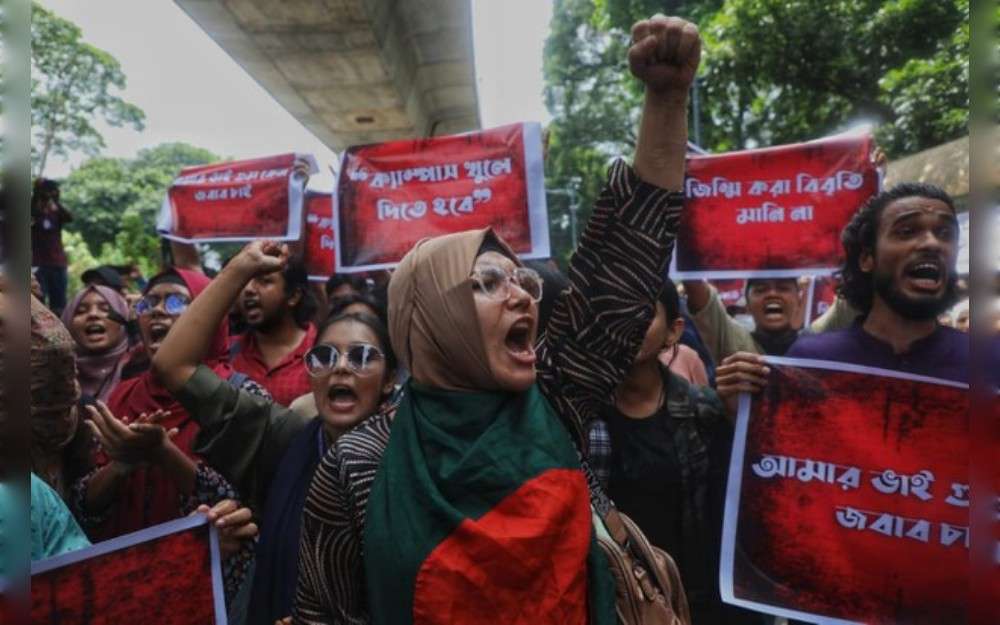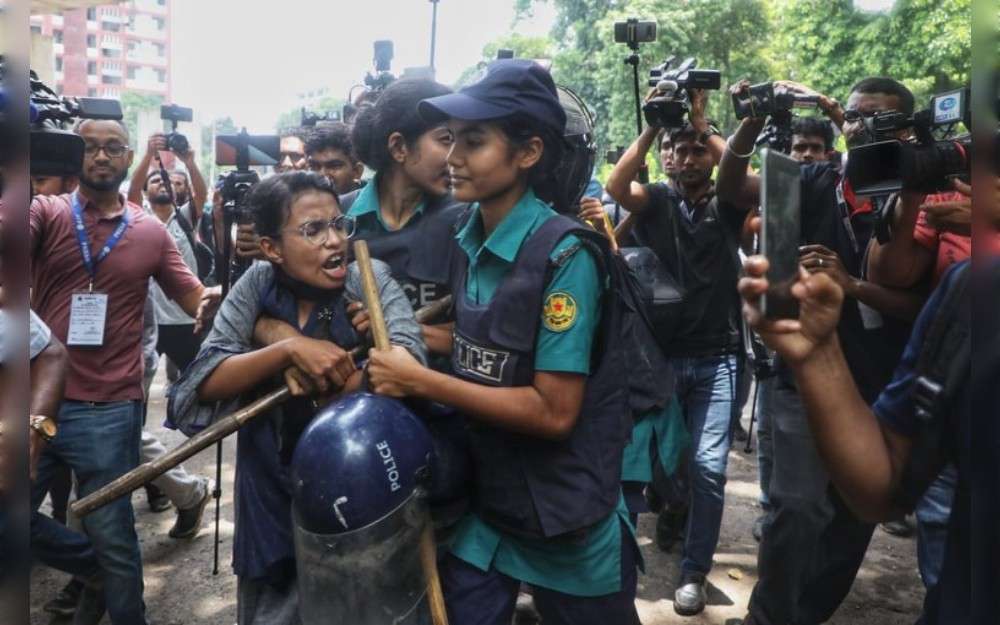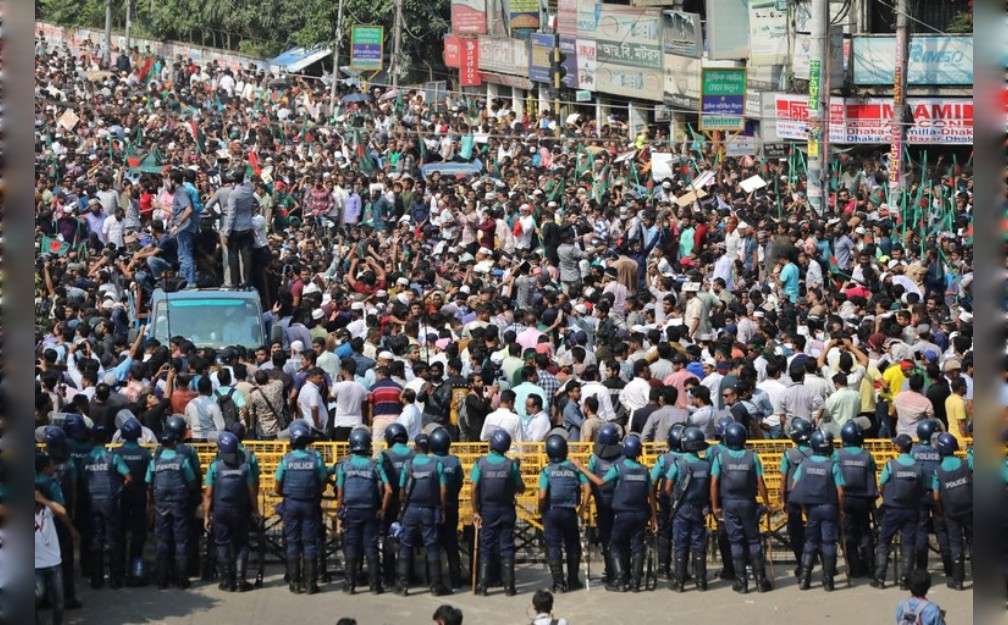In a related development, government bans largest Islamic faith-based party, blaming it for deadly unrest.
BenarNews staff/Dhaka

Tens of thousands of people from all walks of life took to the streets in Bangladesh’s major cities Wednesday to protest the deadly clashes and arrest of demonstrators this month during what began as anti-quota demonstrations by students.
Bangladesh’s government, meanwhile, banned the country’s fourth-largest party, Jamaat-e-Islami, blaming it for the violence and death. Analysts said the move was an attempt to divert attention from the political crisis facing Prime Minister Sheikh Hasina’s administration.
International condemnation also has continued to pour in against the actions by the country’s law enforcers during the mid-July civil unrest that killed over 200 people.
Still, on Wednesday, police tried to disperse protesters by charging at or hitting them with batons in some cities, firing rubber bullets in others, and using tear gas, said Rifat, one of the protest coordinators.
Demonstrators, including teachers, parents, lawyers, and social and rights activists, participating in what was dubbed “March for Justice,” were injured and arrested as well, he said.
“According to our primary estimate, over 100 protesters were injured Wednesday across the country while holding peaceful rallies. And more than 100 students were arrested,” Rifat informed participants at a demonstration in Dhaka.
He added that the fact that so many non-students joined demonstrations, showed they had been on the side of the anti-quota students who were fighting the “tyranny” of the government.
What began as university students’ protests against quotas in some government jobs spiraled into deadly clashes a little over a week ago after what many said was a heavy-handed response by law enforcement to stem the demonstrations.
In bigger cities such as Dhaka, Chattagram, Sylhet, Barishal, Rajshahi and Khulna, Wednesday’s protests on the streets lasted for close to three hours.

Lutfor Rahman, a Dhaka University faculty member, noted that many students could not spend the night in their university dormitories or their relatives’ houses for fear they would be arrested.
“We want justice for the killings and an end to the police harassment and mass arrest,” he told protesters.
Amid hundreds of arrests, Dhaka Metropolitan Police had detained six student leaders between Friday and Sunday reportedly because they said they were feeling insecure, although relatives and colleagues said the six had not sought police assistance.
On Wednesday as well, police tried to arrest demonstrators in some parts of the country but released them as the crowds tussled with officers.
In the northeastern district of Sylhet, police used stun grenades in addition to tear gas, they confirmed to Reuters news agency.
“We requested the protesters to move from the road, but they didn’t listen and instead attacked the police, forcing us to disperse them with tear gas and stun grenades,” Regional Deputy Commissioner Azbahar Ali Sheikh told Reuters.
Elsewhere, witnesses and protesters said police charged at and beat women students with batons, such as in Barishal city, said Rifat, who uses one name.
“We hope the people from all strata will join us in the fight to end the tyranny,” he said.
Dhaka Metropolitan Police spokesman Md. Faruk Hossain told BenarNews on Wednesday night that protesters in Dhaka agitated near the lower court premises and in front of the Supreme Court.
He confirmed police dispersed protesters, but declined to say how many were arrested.
BenarNews reporters have confirmed 212 deaths during the mid-July civil unrest, based on various sources, including hospitals and police.
Bangladesh’s home minister announced Sunday that 147 people had been killed, releasing a death toll for the first time.
About 9,000 people were detained across the country, most of them opposition leaders, workers and general students, according to police and local media.
The week of clashes among anti-quota student protesters, security forces and government supporters constituted the country’s worst civil unrest in over a decade and a major challenge to Hasina’s 15-year hold on power.
Jamaat banned as ‘terrorist organization’
Law Minister Anisul Huq on Wednesday confirmed to BenarNews that Jamaat-e-Islami Bangladesh was banned under the Anti-Terrorism Act of 2009.
“Jaamat is a terrorist organization, he said.
“It is established through judicial judgment on war crimes that Jamaat as an organization killed civilians and committed crimes against humanity during the war of independence in 1971.”
The ban will disallow the controversial Jamaat, an all-weather ally of the current opposition Bangladesh Nationalist Party (BNP), from holding any political and social activities, he said.
Jamaat-e-Islami has been controversial since the country’s independence because it opposed what was then known as East Pakistan breaking from West Pakistan. Many of the party’s top leaders have since been executed for crimes against humanity allegedly committed during the 1971 war.
The Election Commission deregistered Jaamat as a political party in 2013, which meant its members were prohibited from contesting elections.

The ban on the Jamaat now was just a bid to distract from the current crisis, analysts said.
Asif Nazrul, a law professor at Dhaka University, told BenarNews the government’s move against Jamaat makes its intention clear.
“The motive behind this is to shift the public attention from the protests,” he said.
Political commentator and author Nizam Uddin Ahmed said the faith-based party was already defanged.
“Jamaat and its student front Islami Chhatra Shibir cannot hold any activities due to the decision of the Awami League government. The police round them up when they assemble to hold meetings,” said Nizam, a retired Chattogram University professor.
“Against this backdrop, banning Jamaat-Shibir would not cause any impact among the people.
“Besides, he said, most Jamaat and its student wing’s leaders have made their way into parties such as the BNP and other Islamic parties,” he said. “Some of them have even infiltrated into the [ruling] Awami League and its front organizations.”
Copyright ©2015-2024, BenarNews. Used with the permission of BenarNews.














